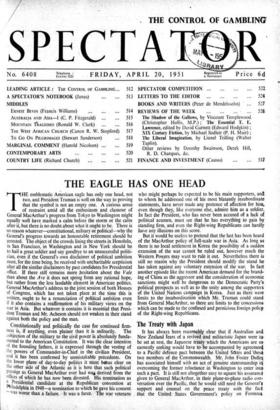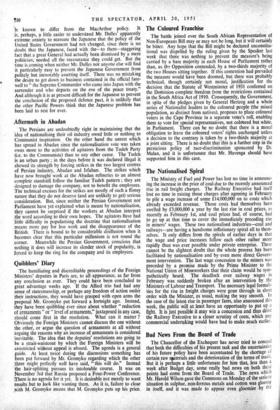The Treaty with Japan It has always been reasonably clear
that if Australian and New Zealand fears of a revived and militaristic Japan were to be set at rest, the Japanese treaty which the Americans are so earnestly seeking would have to be accompanied by agreement to a Pacifid" defence pact between the United States and 'these two members of the Commonwealth. Mr. John Foster Dull et has associated himself with an act of genuine statesmanship i4 overcoming the former reluctance' in Washington to enter into such a pact. It is still not altogether easy to square his assurance given to General MacArthur, in their plane-to-plane radio con- versation over the Pacific, that he would still need the General's support and counsel on the peace treaty with the fact that the United States Government's policy on Formosa is known to differ from the MacArthur policy. It is, perhaps, a little easier to understand Mr. Dulles' apparently extreme anxiety to reassure the Japanese that the policy of the United States Government had not changed, since there is no doubt that the Japanese, faced with the—to them—staggering fact that a great General had actually been dismissed by a mere politician, needed all the reassurance they could get. But the time is coming when neither Mr. Dulles nor anyone else will find it particularly easy to prevent the Japanese Government from politely but inexorably asserting itself. There was no mistaking the desire to get down to business contained in the official fare- well to " the Supreme Commander who came into Japan with the surrender and who departs on the eve of the peace treaty." And although it is at present difficult for the Japanese to prevent the conclusion of the proposed defence pact, it is unlikely that the other Pacific Powers think that the Japanese problem has been laid to rest for ever.



































 Previous page
Previous page